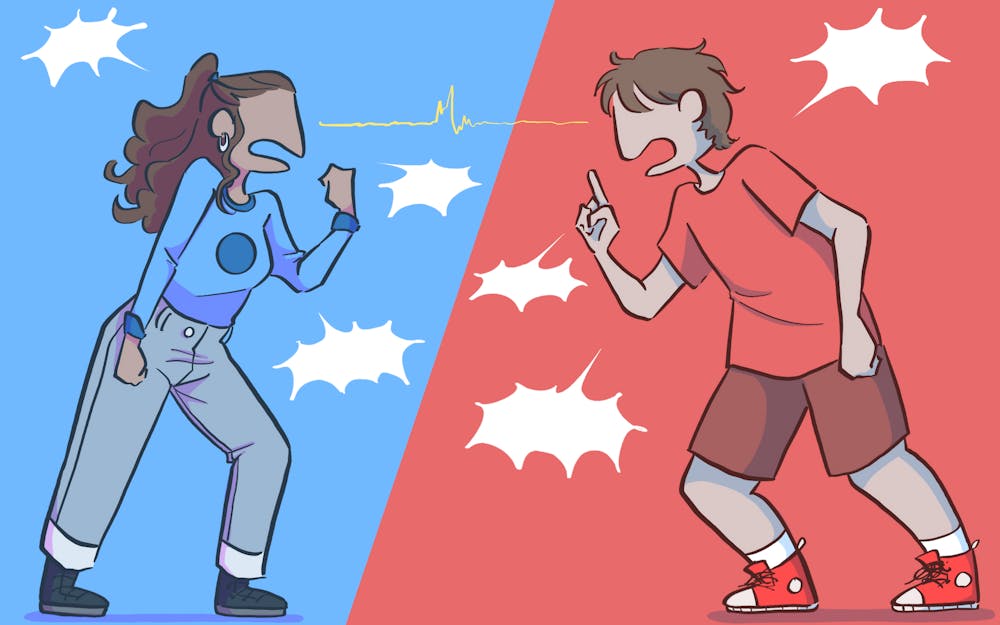Have you ever been in a group setting and been asked the awkward question, “Who are you voting for this election?”
The question is thrown around quite often, as our presidential election is just days away. This question scares me, and it makes me feel as if the answer I propose can be life or death. Whether or not you choose to answer, tensions rise. In our modernized society, political ideologies have become more of a belief than an associated political party.
The repetitive conversations I’ve had with friends, usually look something like;
“If you aren’t voting for (candidate X) then you need to become educated.” one friend said.
“Well, I am voting for (candidate Y),” friend two said, with an eye roll.
You can either agree with a political conversation or disagree. Agreeing, whether genuine or not, can be a safe response, which I feel more comfortable doing. However, what does one do when they are on the opposite side of the political spectrum as their friend?
Speaking up and stating your dissonance on the matter can cause one to feel alienated from you. It’s almost as if it is offensive to tell someone that you do not agree with them politically. Sometimes, people even go as far as to explain why their side is the correct one. The only thing that could come from this is tension.
Our nation has always debated politics, and polarized beliefs go back to our founding — the federalists and anti-federalists argued about the extent of the federal government in the 18th century. However, since then we have not learned from the examples of polarizing our nation due to political affiliations. I feel our political division increased with the COVID-19 pandemic, which isolated people for months and built stronger political tensions, due to the controversial topics about mitigating the virus, masks and vaccinees.
Why do we feel as though we must support “our side” of a political spectrum so heavily, as if there can’t be a happy medium? Is it because of the immense number of one-sided media that is published?
Listening to news that agrees and continuously reinforces ideas you currently believe in can only make one feel stronger about the ideas they have previously discovered. Politically driven outlets, such as FOX News and CNN, aim to attract a specific type of viewer with a specific belief system. According to Pew Research Center, 65% of Republicans stated a strong belief in FOX news, while 67% of Democrats reported a strong belief in CNN.
The audience will inevitably come back for more and will hear about the preexisting standpoints they have. This echo chamber phenomenon is only increasing as technology advances with the age of social media. Social media platforms use algorithms to provide users with a specific type of content that is personalized to their interests. For example, TikTok utilizes a “For You Page,” which allows for endless scrolling based off content you’ve previously shown interest in. I’ve realized this effect, as I scroll on my own social media platforms; when I interact with a certain topic, it becomes the only type of media I access.
Being reassured by someone is always comforting. Whether it is by finding someone who is rooting for the same sports team or political party, we naturally want to surround ourselves with people who agree with us. This can be dated back centuries, as voters who agree with their beliefs can be seen as respectable and educated, while those who don’t are seen and misunderstood or threatened. For example, during the women’s suffrage movement, men who opposed women’s right to vote argued women were “uneducated” while they were simply fighting for their democratic right.
Centuries ago, people identified with statements such as “I’m Christian” or “I’m a doctor.” But that has now changed to “I’m liberal” or “I’m conservative.” This shift proves the priority people have over their political parties, and how much it has begun to take over their lives.
Stanford professor Shanto Iyengar stated how political affiliation has appeared as one of the most important parts of human identification in the United States, exceeding other prominent identifiers such as race, religion and occupation.
To what extremes are we going to continuously allow these identifications to take over aspects of our lives? Is it more important to push people away who are important to us? Or is it better to associate solely with those who support and reinforce our beliefs? This issue has continuously divided people, yet we as a society can help negate this issue, by working together to hear different perspectives, and accept alternative beliefs.
Political parties have gone from rallying people to building walls around us, which turns every debate into a battlefield, where winning feels more important than coming together.
Brooke Meere (she/her) is a freshman studying journalism.






